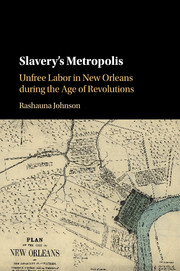Crossref Citations
This Book has been
cited by the following publications. This list is generated based on data provided by Crossref.
2016.
We Dream Together.
p.
335.
Finucane, Adrian
2018.
Trade and organization in the colonial Caribbean.
History Compass,
Vol. 16,
Issue. 7,
Stern, Walter C.
2018.
Long before Ruby’s Walk: New Orleans Schools, Race, and Thinking beyond Backlash.
The Journal of African American History,
Vol. 103,
Issue. 4,
p.
526.
Savala, Joshua
2019.
Ports of Transnational Labor Organizing: Anarchism along the Peruvian-Chilean Littoral, 1916–1928.
Hispanic American Historical Review,
Vol. 99,
Issue. 3,
p.
501.
Araujo, Ana Lucia
2020.
Afterword: Ghosts of Slavery.
International Review of Social History,
Vol. 65,
Issue. S28,
p.
225.
O’Donovan, Susan Eva
2020.
Thinking about the political lives of slaves.
American Nineteenth Century History,
Vol. 21,
Issue. 1,
p.
25.
Friedman, Andrew
2020.
A Companion to U.S. Foreign Relations.
p.
652.
Croegaert, Ana
2020.
Architectures of Pain: Racism and Monuments Removal Activism in the “New” New Orleans.
City & Society,
Vol. 32,
Issue. 3,
p.
579.
Klooster, Wim
2020.
Comparative Perspectives on the Urban Black Atlantic on the Eve of Abolition.
International Review of Social History,
Vol. 65,
Issue. S28,
p.
15.
Chazkel, Amy
2020.
Toward a History of Rights in the City at Night: Making and Breaking the Nightly Curfew in Nineteenth-Century Rio de Janeiro.
Comparative Studies in Society and History,
Vol. 62,
Issue. 1,
p.
106.
Salgarolo, Michael Menor
2021.
Journeys to St. Malo: a history of Filipino Louisiana.
Rethinking History,
Vol. 25,
Issue. 1,
p.
77.
Norwood, Bryan E.
2021.
Museum, Refinery, Penitentiary.
Places Journal,
Müller, Viola Franziska
2022.
“Employed at the Works of the City”.
Journal of Global Slavery,
Vol. 7,
Issue. 1-2,
p.
153.
Echeverri, Marcela
2022.
Slave Exports and the Politics of Slave Punishment during Colombia’s Abolition Process (1820s–1840s).
Journal of Global Slavery,
Vol. 7,
Issue. 1-2,
p.
73.
2024.
Fire Dreams.
p.
172.
2024.
Fire Dreams.
p.
265.
2024.
Fire Dreams.
p.
1.
2024.
Fire Dreams.
p.
29.
2024.
Fire Dreams.
p.
210.
2024.
Fire Dreams.
p.
132.



